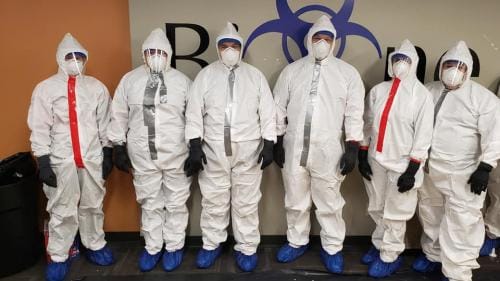Bio-One recently had the honor of helping a Veteran's family with a cleanout. He had worked at Minneapolis airport for 30+ years as a mechanic and was being sent home to Texas. These are the moments we really appreciate what we do at Bio-One. We are honored to help and support his family. Thank you for serving our country.
We love seeing Bio-One offices send in their mask pictures! Everyone is looking awesome and staying safe. Thanks for doing your part!
Bio-One has a whole group of new franchises in training! We love seeing fresh faces and welcoming an awesome bunch of people into the Bio-One family. Thank you everyone for coming out to training and we can't wait for you to open!
Great work to our Bio-One office in Charlotte. They recently hosted a blood drive in Charlotte, NC. What a great way to give back to the community in such a great way!
If you know of someone in need of our services, please take a look at our locations to find the nearest Bio-One office near you. Stay safe!
B.O.T.S. Training has a new protocol during the pandemic. Desks are placed 6 feet apart for safe distancing while in training. Pictured here are our new offices suited up and ready to do a mock scene.
Join us in welcoming three new California offices (Poway, Pasadena, and Temecula) and certified technicians for Houston South, Reno, Akron and Gwinnett County. Welcome aboard!
Exciting News! All of our Arizona offices have banded together to create a Bio-One Law Enforcement Grant in their state. Each Arizona office is contributing towards the grant and expenses associated with it. They'll be awarding a $5,000 Grant to a local, law enforcement agency. We love when our offices combine forces for a great cause! Help first, business second is what we are all about at Bio-One!
If you know of someone in need of our services, please take a look at our locations to find the nearest Bio-One office near you. Stay safe!
April 19-25th, 2020 is National Crime Victim's Rights Week!
Bio-One has the opportunity to help people after an unfortunate event, but we understand the pain of survivors is a long and ongoing process. We operate by the motto: help first, business second and we believe a community support system is such a great way to help those around you.
If you know someone who has personally been affected by crime, please take this week to reach out to them. Send flowers, a card, have a conversation or coffee with them and let them know they are loved and supported.
Gary Maxey in Savannah recently cleaned homeless veteran's tiny homes. This is part of a tiny house project in Savannah, Georgia where tiny homes are provided for homeless veterans either permenantly or as a transitional place. At Bio-One, we are honored to be a part of causes like this. We are here to help and love when we can help make a difference.
If you know of someone in need of our services, please take a look at our locations to find the nearest Bio-One office near you. Stay safe!
Welcome to our last month's B.O.T.s training crew! Bio-One is proud to announce a new Atlantic City location as well as technicians from Dayton, Huntsville, and Tampa getting certified! Great job to our new franchise and technicians!

If you know of someone in need of our services, please take a look at our locations to find the nearest Bio-One office near you. Stay safe!
Matt and Krista Gregg from Bio-One of Asheville have taken the time to make some goodie boxes for their local police department and crisis advocates! These look delicious and are a great way to create relationships and show your support.
If you know of someone in need of our services, please take a look at our locations to find the nearest Bio-One office near you. Stay safe!